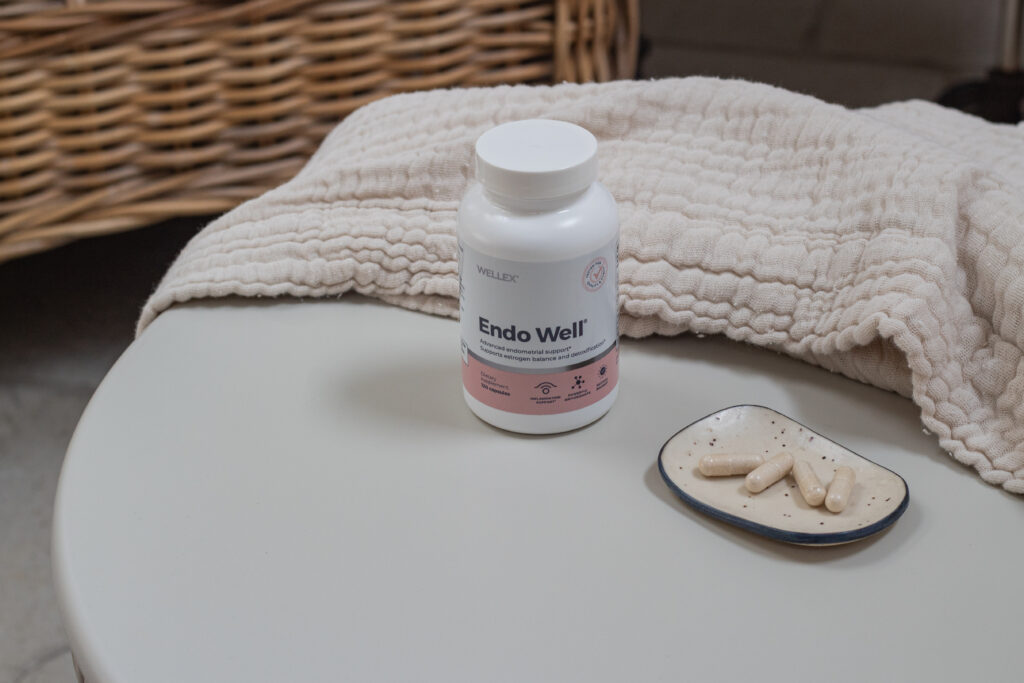The Hidden Link Between Inflammation & Estrogen Metabolism: Why Your Liver Is Doing More for Your Hormones Than You Think
Table of Contents
What does my liver have to do with my hormones?
Your liver does far more than process toxins and alcohol — it’s also a hormonal powerhouse.
One of its key roles is estrogen metabolism: helping to break down and process estrogens so they can be used effectively and cleared from the body when needed.
In this process:
- Phase I liver enzymes modify estrogens (like estradiol and estrone) into intermediate forms.
- Phase II pathways then conjugate these metabolites — binding them to molecules like methyl or sulfur — to make them water-soluble.
- Elimination: These conjugated forms are then excreted through bile and urine.
If these steps slow down, estrogen metabolites may be reabsorbed and recirculated. Research suggests that liver metabolism of estrogen depends on antioxidant balance and methylation function, which may be influenced by inflammation and nutrient status
(Estrogen Signaling in Metabolic Inflammation, PMC).
How does inflammation affect estrogen metabolism?
Chronic inflammation may influence liver function and impact hormone metabolism. Inflammatory molecules like TNF-α and IL-6 can:
- Affect the health of liver cells (hepatocytes)
- Influence the activity of enzymes involved in hormone processing (CYP450s, COMT, UGTs)
- Reduce antioxidant capacity (like glutathione availability)
- Slow methylation and sulfation — key steps in Phase II metabolism
Gut inflammation may also play a role by increasing the activity of β-glucuronidase, an enzyme that can deconjugate estrogens in the intestines, allowing them to be reabsorbed — a process known as enterohepatic recirculation.
Research indicates that estrogen normally supports anti-inflammatory processes in the liver, but when inflammation or liver stress is high, these protective effects may be diminished
(Frontiers in Immunology, 2022).
The result? Estrogen metabolism may become less efficient, potentially contributing to changes in hormone balance and inflammatory signaling.
What are signs my estrogen metabolism might need support?
Everyone’s hormone balance is unique, but some signs that your estrogen processing may be less efficient include:
- PMS, mood swings, or breast tenderness
- Heavy or painful periods
- Hormone-sensitive conditions (such as endometriosis or fibroids)
- Water retention or bloating
- Fatigue, brain fog, or skin changes
- Weight changes, especially around the hips or thighs
Functional testing may help identify whether these metabolic pathways could benefit from additional nutritional or lifestyle support.
Why is the connection between inflammation and estrogen such a big deal for women’s health?
Because it’s bidirectional.
- Inflammation may influence how the body metabolizes estrogen.
- And changes in estrogen levels may, in turn, affect inflammatory pathways.
This relationship has been highlighted in studies showing that inflammation and estrogen signaling interact at multiple cellular levels
(Complex Role of Estrogens in Inflammation, Endocrine Reviews).
In conditions like endometriosis, PMS, and perimenopause, this interaction may contribute to symptoms such as fatigue, discomfort, or cyclical changes. Chronic inflammation can also increase oxidative stress, which may further impact hormone signaling and metabolism efficiency.
How can I help maintain healthy estrogen metabolism naturally?
Supporting estrogen metabolism begins with everyday foundations: reducing inflammation, maintaining liver function, and nurturing gut health.
1. Eat for your liver and hormones
- Include cruciferous vegetables (broccoli, kale, cabbage, Brussels sprouts) for compounds like sulforaphane and DIM, which support balanced estrogen metabolism.
- Increase fiber intake (fruits, vegetables, oats, flax) to help bind and eliminate excess estrogen metabolites in the gut.
- Add omega-3 fats (salmon, flaxseed, chia) to help maintain inflammatory balance.
- Limit processed sugar, alcohol, and refined oils that can contribute to oxidative stress.

2. Support antioxidant and methylation pathways
Your liver requires key vitamins and minerals for optimal enzyme function.
- B-vitamins, magnesium, choline, and folate help with methylation.
- Vitamin C, vitamin E, and N-acetylcysteine (NAC) help maintain antioxidant activity and glutathione levels.
3. Nurture your gut
A healthy gut supports balanced hormone metabolism. Beneficial bacteria help process estrogen, while inflammation or dysbiosis may interfere.
Learn more in our related article, 4 Ways to Improve Your Gut Health, which explores how digestion, elimination, and microbial balance can support hormonal wellness.
- Add fermented foods (kimchi, sauerkraut, kefir).
- Support gut integrity with zinc, glutamine, or probiotics.
- Maintain regular digestion — daily bowel movements help support estrogen metabolism.
4. Live anti-inflammatory
- Move your body regularly (walking, resistance training, yoga).
- Prioritize stress management and sleep (since cortisol affects hormone signaling).
- Stay hydrated to support natural elimination pathways.
Can supplements play a role in supporting estrogen metabolism?
When combined with nutrition and lifestyle strategies, certain supplements may help maintain efficient estrogen metabolism — particularly in individuals experiencing inflammation or hormone-related symptoms.
This is where Endo Well by Wellex may play a role. Its ingredients are formulated to support antioxidant balance, inflammatory regulation, and healthy hormone metabolism.

How does Endo Well support estrogen metabolism and inflammation?
Each ingredient in Endo Well is backed by research for its role in maintaining hormone balance and supporting inflammatory and oxidative processes:
| Ingredient | Function & Research Insight |
| DIM (Diindolylmethane) | Supports balanced estrogen metabolism and helps maintain a healthy estrogen ratio. |
| N-acetylcysteine (NAC) | Helps maintain glutathione levels and antioxidant status. Studies suggest NAC may support symptom management in endometriosis. |
| PEA (Palmitoylethanolamide) | Helps regulate inflammation and supports healthy pain signaling through the endocannabinoid system. |
| Polydatin (resveratrol precursor) | Provides antioxidant and anti-inflammatory support for vascular and immune health. |
| Vitamins C & E | Work synergistically to protect cells from oxidative stress and support repair. |
| Vitamin D | Helps regulate immune and inflammatory responses; supports hormone receptor sensitivity. |
| Magnesium | Supports methylation and relaxation; often low in individuals under chronic stress. |
| Ginger & Ashwagandha | Help support stress resilience and maintain inflammatory balance. |
Together, these ingredients may help the body maintain efficient estrogen metabolism and balanced inflammatory signaling.
How do inflammation, liver health, and estrogen metabolism connect to endometriosis?
Endometriosis is one example where inflammation and hormone metabolism are closely intertwined.
- Inflammation from lesions may increase oxidative stress and liver workload.
- The liver’s metabolic pathways may become less efficient, allowing unmetabolized estrogens to recirculate.
- Higher levels of active estrogen may further influence tissue growth and inflammatory processes.
Supporting both immune balance and liver metabolism through diet, lifestyle, and targeted nutrients — like those in Endo Well — may help promote overall hormonal wellness.
Here’s What It All Means for You
Your liver isn’t just a filter — it’s an essential part of hormone balance.
When inflammation is present, estrogen metabolism may slow, influencing how your body maintains hormonal equilibrium.
By focusing on anti-inflammatory nutrition, supportive lifestyle habits, and evidence-based supplementation such as Endo Well, you can help your body maintain efficient estrogen metabolism and overall hormonal wellness — naturally and safely.

References:
Share: